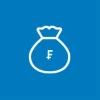If you would like to receive a detailed comparison of the costs and performance of Swiss retirement funds, simply enter your email address in this field and click on “Request free PDF”.

Massive Differences Between Pillar 3a Funds
moneyland.ch examined the performance and fees of Swiss retirement funds in 2021. The results show that some retirement funds are more than seven times more expensive than the cheapest funds. Differences in annual performance exceed 40 percentage points.
The ongoing negative interest environment has been driving up the popularity of investing with pillar 3a retirement funds every year. This trend has also been encouraged by Swiss banks, which have upped their spending on promoting the advantages of pillar 3a funds. We have also witnessed the launch of numerous new retirement funds with high stock components. Unlike pillar 3a savings accounts, these have the ability to deliver yields even when interest rates are negative.
But how good are Swiss retirement funds, really? In order to answer that question, independent Swiss online comparison service moneyland.ch studied 85 retirement funds (these are listed in the PDF comparison available at the foot of this article).
This is what retirement funds cost
The total costs of using a retirement fund are a deciding factor because they detract from future performance. “A comparison of all applicable fees is important,” reiterates moneyland.ch CEO Benjamin Manz.
In order to find these figures, moneyland.ch calculated the total cost of investing 100,000 Swiss francs over a 10-year term with each individual fund. In addition to the total expense ratio (TER), possible custody fees, sales charges, flat fees, and deferred sales charges were also accounted for in calculations.
The results of the moneyland.ch study show that the average cost across all included retirement funds is 1.08 percent per year.
But there are huge differences between individual funds. The total cost of investing 100,000 francs over a 10-year term with the most expensive fund is 17,400 francs, or 1.74 percent per year. Other funds have total costs of just 2300 francs (2.3 percent per year) for the same investment and term.
Passive retirement funds are cheaper
Actively-managed funds cost 1.17 percent, on average. The average cost of passively-managed funds is just 0.76 percent. “Passive funds are generally much cheaper, and therefore preferable to active fund,” recommends moneyland.ch analysts Felix Oeschger.
Passively-managed retirement funds also perform better, on average. Actively-managed funds rarely manage to achieve the exceptional returns needed to compensate for their higher costs.
Swiss retirement fund performance
In addition to costs, moneyland.ch also analyzed the performance of Swiss retirement funds – accounting for TER costs - across 1-year, 3-year, 5-year and 10-year terms, each ending on October 31, 2021.
The results show that the higher the stock component of a retirement fund is, the better the fund performed across the studied periods. The simple explanation is that stock markets have performed similarly well across all of those time frames.
It is important to understand that historical performance is not a key criterion for choosing a retirement fund. “Key factors in choosing retirement funds are your personal risk tolerance and the total costs,” says Oeschger.
In past years, the 85 retirement funds included in the studied delivered average performance of 14.5 percent. The worst-performing fund achieved a negative -1.2 performance, while the best-performing fund had positive performance of 41 percent.
For the 3-year term, performance ranged between -2.6 and 54.9 percent, depending on the fund, with the average across all funds being 20.5 percent. For the 5-year term, the average performance was 24.1 percent, with the performance of individual funds ranging between -4.4 and 58.9 percent.
Figures for the 10-year term are the most revealing. The average performance across all funds during this term was 51.7 percent. The worst-performing fund had negative -6.3 percent performance, while the best-performing fund had 88.2 percent performance.
For the sake of comparison, the performance of the Swiss SMI stock market index over the same terms was 30.1 percent (1-year), 47.7 percent (3-years), 81.9 percent (5 years), and 192.2 percent (10 years).
Two steps for finding the right pillar 3a fund
The sheer number of funds available leaves many investors feeling confused, and they turn to advisors for help. But choosing the right retirement fund for your pillar 3a or vested benefits does not have to be difficult.
Firstly, you need to consider how large a stock component you want, as this defines the investment strategy. The higher the stock component is, the bigger your returns will be – but short-term losses in value will also be bigger. A fund made up entirely of stocks is riskier over the short term. But over long investment terms of ten years or more, the risk steadily decreases as the term progresses – as long as the fund is well diversified. For that reason, using a fund with a large stock component is recommended if you will leave your money invested for at least ten years.
Secondly, once you have chosen your stock component, you need to find the most affordable fund which matches your investment strategy. In most cases, the pillar 3a funds offered by your bank will not be the cheapest available. That is why it pays to run an independent comparison. You can simply use the interactive retirement fund comparison on moneyland.ch to quickly and easily find the cheapest fund for the stock component you want. Another option is to use digital retirement asset management services, as these are often very affordable.
More on this topic:
Compare Swiss retirement funds now
Use these calculators for retirement planning
Compare pillar 3a retirement accounts now
Swiss Retirement Funds
Piguet Galland retirement fund
Custody account at Vaud Cantonal Bank
3a and vested benefits
Different variants for equity component
Retirement funds of BLKB
BLKB iQ Fund - Responsible Equity
Retirement funds with low costs
3a and vested benefits
 Deal of the Day
Deal of the Day  Pension solution
Pension solution
Piguet Galland retirement fund
Custody account at Vaud Cantonal Bank
Pillar 3a Accounts
Vaudoise Insurance
3a Savings
Tax-deductible
Cornèr 3a
Attractive interest rate
3a tax savings
No account management costs
Brokers with low fees
Cornèrtrader Special Offer
Special offer: particularly favorable conditions for Moneyland users
No custody account fees for shares
Swiss online bank with FINMA license
Methodology
moneyland.ch studied 85 Swiss retirement funds to determine their costs, terms and conditions, and returns. Assumptions and notes:
- All cost information matches that provided by service providers (as per October 2021).
- TER figures indicate ongoing expenses. Costs which are not accounted for in the TER (but are included in total costs calculations) include custody fees, sales charges, deferred sales charges, and flat fees. The study uses TER KGAST or synthetic TER figures when available. All information is provided ex post.
- Total costs: The modelled calculation is based on the assumption of a 100,000-franc investment which remains unchanged year on year. Assumption: The investor buys fund shares at the start of the investment term and sells these after ten years. The total costs include the TER and possible custody fees, sales charges and deferred sales charges, and flat fees. The interactive retirement fund comparison on moneyland.ch served as the basis for calculations.
- Performance was calculated based on net asset values from Swiss Fund Data or from information published by fund managers. Performance figures account for the cost of TERs, but not for custody fees, sales charges, and flat fees.
- Performance calculations are based on the assumption that returns and/or dividends are reinvested in the fund without the deduction of commissions or taxes (stamp duties, for example).







